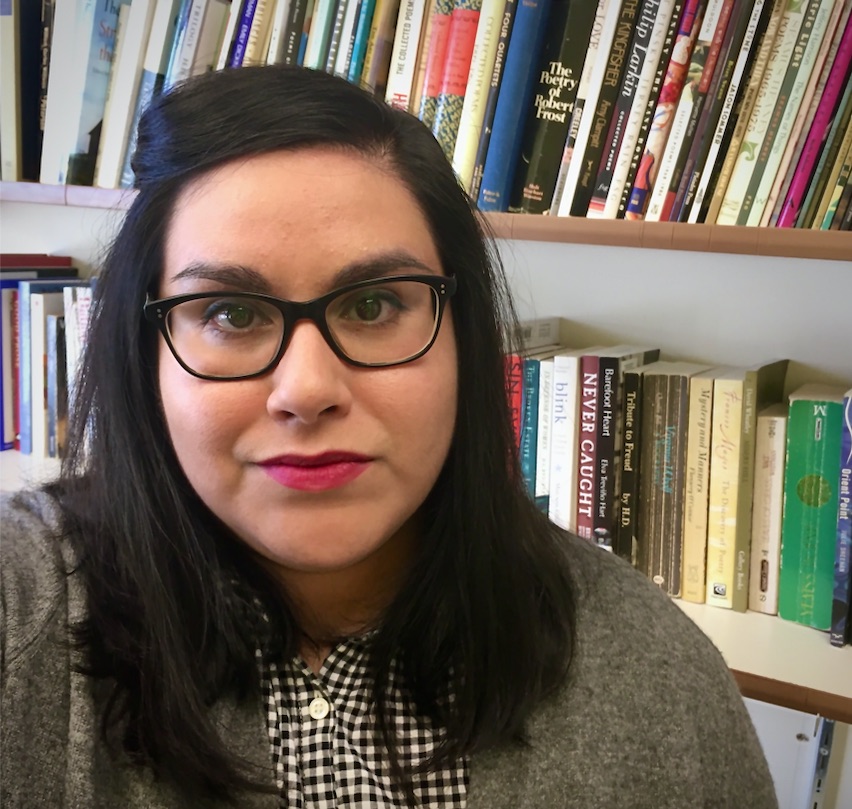This Q&A is part of the story series Voices of Drake that highlights the diversity, ambition, and passion of the incredible people that make up our campus community. This week’s story is designed to celebrate and shine light on Latinx Heritage Month, Sept. 15–Oct. 15. It spotlights Leah Huizar, assistant professor of English.

Tell us about yourself.
I am a Mexican-American poet and writer originally from Southern California. Growing up, I was fortunate to be raised around a large family composed of not only my sisters and parents but also an extensive extended family of grandparents, aunts, uncles, and cousins. I love the cold waters of the Pacific Ocean and the great forests of my home state. Since moving away, I have lived on the East Coast, in the South, and now the Midwest.
Tell us about your education. Where did you go to school and what did you study?
As an undergraduate, I was a double major in English and psychology. I also minored in biblical studies. Though I didn’t know it at the time, looking back, I see how these fields spoke to my longstanding interests in the forces that influence and regulate our lives. As an English major, my most transformative classes were on literary and critical theory. It was there that I first began to understand the ways in which systems and structures operate all around us—and how, through language and engagement, we can respond to them. After college, I went to Penn State for graduate school where I received my MFA.
How has your cultural heritage influenced the person are today/your views of the world/or your field of work?
As a poet, I most often write from the intersections of the personal and historic. What this has meant for me is that my Mexican-American identity shapes and motivates many of the kinds of questions I examine in my writing.
What creative projects are you working on right now or what have you been working on recently? What drew or draws you to this project?
My first book of poems was recently published by Noemi Press. It’s called Inland Empire and draws on the cultural and historic landscapes of the West Coast and the ways in which colonization, faith, and gendered injustices have shaped it. My current writing project takes on similar questions through an exploration of communication circuits. How do we make and share our voices? How are these obscured or suppressed in our wider culture?
What kinds of courses do you teach? How do your courses connect to your writing life or fit within your broader academic vocation?
I teach poetry writing courses in the English department. I also have taught or will teach the Writing Seminar, US Latinx Literature, First Year Seminar, and Intro Women and Gender Studies. To me, each course is an opportunity to ask big questions of writing, of gender, and of ethnicity with really smart student scholars.
How do you hope students come to look at the world differently as a result of their work in your courses?
At every course level, and whether literature or poetry, my courses examine how we craft the world through language. Language is always high stakes and consequential. So, our ability to effectively, authentically, and persuasively use it is a dynamic kind of power to carry into the world. This is what we do as writers.
How long have you been at Drake? What is your favorite thing about working at Drake so far?
This is my second year at Drake! Among the many joys of working here, I am most impressed with Drake students. There are few things as wonderful as working with students who want to learn and are willing to stretch themselves intellectually.
What is your favorite thing about the Drake neighborhood?
I have really enjoyed visiting Mars Cafe for coffee and Lzaza Indo-Pak Cuisine for the chai tea served with lunch.
Who has been the biggest influence in your life and what lessons did that person teach you?
I’ve been fortunate to have had many brilliant women as mentors in my life. One influence has been my grandmother. She sees everything—an observer—and this is a central skill for a writer.
How do you like to spend your free-time? Tell us about your hobbies and interests.
Creativity is an important part of my life. In recent years, I’ve worked on bookmaking and letterpress printing. I collect antique printing presses which are big cast iron machines that work with metal or wood type. In the past, I’ve printed posters, booklets, and a chapbook of bilingual short stories.
This year is a year like no other. What advice would you like to give to a first-year student at Drake?
No doubt this year is challenging and yet I see students adapting and responding with hope and endurance. On a large scale, I see students rejecting injustice, inequity, and racism and defining the kinds of future they will accept from culture. It may be that students ought to advise the rest of us. If pressed, however, I would say please don’t hesitate to reach out to your professors when you need assistance. We want you to thrive!
